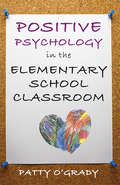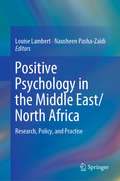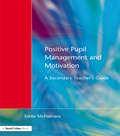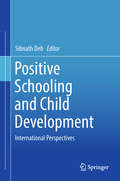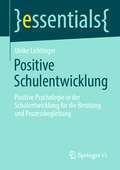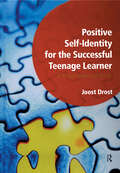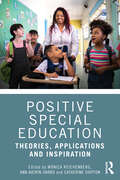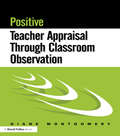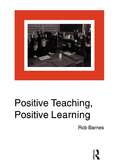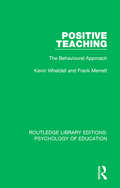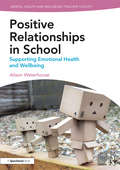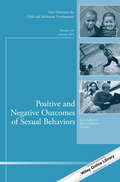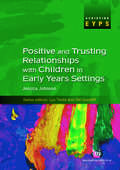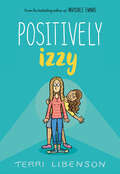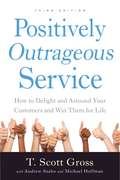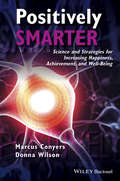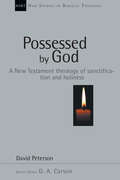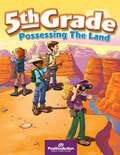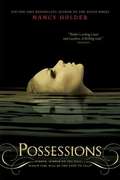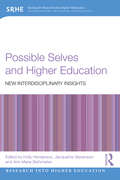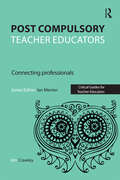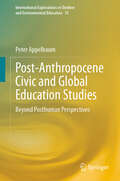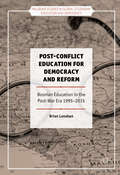- Table View
- List View
Positive Psychology in the Elementary School Classroom
by Patty O'GradyUse the neuroscience of emotional learning to transform your teaching. How can the latest breakthroughs in the neuroscience of emotional learning transform the classroom? How can teachers use the principles and practices of positive psychology to ensure optimal 21st-century learning experiences for all children? Patty O'Grady answers those questions. Positive Psychology in the Elementary School Classroom presents the basics of positive psychology to educators and provides interactive resources to enrich teachers' proficiency when using positive psychology in the classroom. O'Grady underlines the importance of teaching the whole child: encouraging social awareness and positive relationships, fostering self-motivation, and emphasizing social and emotional learning. Through the use of positive psychology in the classroom, children can learn to be more emotionally aware of their own and others' feelings, use their strengths to engage academically and socially, pursue meaningful lives, and accomplish their personal goals. The book begins with Martin Seligman's positive psychology principles, and continues into an overview of affective learning, including its philosophical and psychological roots, from finding the "golden mean" of emotional regulation to finding a child's potencies and "golden self." O'Grady connects the core concepts of educational neuroscience to the principles of positive psychology, explaining how feelings permeate the brain, affecting children's thoughts and actions; how insular neurons make us feel empathy and help us learn by observation; and how the frontal cortex is the hall monitor of the brain. The book is full of practical examples and interactive resources that invite every educator to create a positive psychology classroom, where children can flourish and reach their full potential.
Positive Psychology in the Middle East/North Africa: Research, Policy, and Practise
by Louise Lambert Nausheen Pasha-ZaidiThis volume looks at positive psychology from a culturally-responsive, empirically-driven perspective to avoid a descent into pseudoscience. Through evidence-based, regionally relevant topics in the field of well-being, this volume shows how increasing levels of excellence in the GCC region enhance upon business, education, research, and social innovations. Grounded in the empirical research literature, each chapter applies psychological concepts to locally relevant considerations, such as culture, religion, and socio-political contexts, making this book an essential tool for understanding positive psychology and well-being in the GCC nations and beyond.
Positive Pupil Management and Motivation: A Secondary Teacher's Guide
by Eddie McNamaraFirst Published in 2000. Routledge is an imprint of Taylor & Francis, an informa company.
Positive Schooling and Child Development: International Perspectives
by Sibnath DebThis volume discusses the importance of positive schooling in producing responsible and potentially productive adults. Students are generally more motivated to do well and to realize their full potential in schools that have a positive schooling climate, where they feel safe, included and supported. Nevertheless, the reality in today's schools is very different. This volume discusses the major challenges faced by children and adolescents in schools, including problems with curricula, safety issues, lack of inclusive policies, non-availability of teachers, ineffective teaching, insensitivity towards students’ issues, improper evaluation methods, harmful disciplinary measures, and so on. Experts in child psychology and education discuss these issues at length in this volume and offer viable solutions for policymakers, school administrators, teachers and parents to make suitable changes and create a positive atmosphere in educational institutions. This volume further discusses the role of various stakeholders---school principals, teachers, counsellors and psychologists---in addressing these challenges. In addition, it raises other, emerging issues which have not been covered in previous volumes on this topic and offers evidence-based suggestions to address them. The intended readership of the volume is researchers and students of psychology, education, sociology, social work and public health, and school teachers, administrators and teacher-trainers.
Positive Schulentwicklung: Positive Psychologie in der Schulentwicklung für die Beratung und Prozessbegleitung (essentials)
by Ulrike LichtingerIn diesem essential präsentiert Ulrike Lichtinger den Ansatz der Positiven Schulentwicklung. Sie zeigt, was es braucht, dass Schule gelingt, dass Lehrkräfte und Schülerschaft an ihren Stärken und Potenzialen entlang wachsen und aufblühen können. Dazu stellt sie den theoretischen Hintergrund der Positiven Schulentwicklung vor und gibt konkrete Hinweise zur praktischen Umsetzung des wachstumsorientierten Prozesses PERMAchange. Er nimmt Schulleitung und Kollegium an die Hand und motiviert zu Innovationen in sieben Schritten, die gut tun und gleichzeitig systematisch und strukturiert zum Erfolg führen.
Positive Self-Identity for the Successful Teenage Learner: A Programme or Work
by Joost DrostUsing a narrative approach, teenagers are challenged to learn about themselves, about each other and about how to take control of their lives. The learning is presented in a series of lessons with comprehensive facilitator instructions and materials designed to engage teenagers in both group and individual activities. A story and characters provide a full range of emotions, from the overwhelming feelings of angst and anger to empathy, friendship support and happiness. The material complements the secondary SEAL agenda. A comprehensive guide will help the facilitator to capture the student's emotional world and turn their energies into meaningful and constructive projects. It also provides students with tools to practice and develop their emotional and social intelligence.
Positive Special Education: Theories, Applications and Inspiration
by Monica Reichenberg Ann-Katrin Swärd Catherine ShiptonPositive Special Education spotlights the power of positive special education, combining insights from researchers and teachers in special education from several countries. The expert team of authors, being both teachers and academics, highlight the powerful influence of teachers fostering optimistic approaches as well as the impact a positive educational experience has on young students. Instead of focusing on medical perspectives and individual difficulties, this book’s uniqueness lies in showcasing how educators, students, and care workers can be empowered to overcome daily challenges by changing beliefs and attitudes. Based on extensive experience in schools across Sweden and the UK, this book: contains a history of positive special education and central theoretical concepts such as self-efficacy, implicit theories, and inclusion; explores the potential of digital tools and how they can support students with their learning and development; focuses on instructional methods in reading, writing, and vocabulary development. Practical case studies throughout the book provide various examples for educators to apply the principles of positive special education in different learning environments. It is a must-read for teachers in SEND and mainstream schools, in preschool, pre-service teachers as well as undergraduate or masters’ students in education.
Positive Teacher Appraisal Through Classroom Observation
by Diane MontgomeryFirst Published in 1999. Routledge is an imprint of Taylor & Francis, an informa company.
Positive Teaching, Positive Learning
by Rob BarnesPositive Teaching, Positive Learning offers teachers and student-teachers in training a number of practical strategies for developing and improving teaching and learning. It provides insights into very positive teacher-pupil management and learning, such as ways to increase pupil involvement and give constructive feedback from assessment. The book draws together findings about pupils' and teachers' classroom practice, and suggests how practical steps can be taken to create a positive attitude towards generating high expectations. It includes quoted material researched over five years through interviews with known effective teachers (identified by OFSTED) about the teaching strategies they use.
Positive Teaching: The Behavioural Approach (Routledge Library Editions: Psychology of Education)
by Kevin Wheldall Frank MerrettProblems of classroom management and control are a recurring concern for many teachers. Disruptive behaviour and inattention hinder effective learning and impose a constant drain upon the teachers’ emotional resources. Continual nagging at children only increases teacher stress: what is needed is an effective alternative set of strategies. Originally published in 1984, Positive Teaching seeks to meets this need by presenting the behavioural approach to teaching in a clear, direct and lucid way. By adopting the behavioural approach, problem behaviour can be minimised, or rapidly nipped in the bud when it does arise. While punishment may be used in an attempt to stop almost any kind of behaviour, only the appropriate use of positive methods applied contingently, immediately and consistently can teach new, more adaptive behaviour. This is a crucial issue in real teaching and is rarely encountered or even discussed in most teacher education programmes. It is the central focus of Positive Teaching. This book is for all teachers, from the beginning student to experienced head teachers; for those teaching in a first school, and for those teaching sixth-formers; for those experiencing difficulties and for those whose authority is already well established. The behavioural approach offers practical support to those who are struggling and a rationale for the effective, positive strategies of the successful. We can all improve our teaching.
Positive Working Relationships in School: Supporting Emotional Health and Wellbeing (Mental Health and Wellbeing Teacher Toolkit)
by Alison WaterhouseOne of the five books in the Mental Health and Wellbeing Teacher Toolkit, this practical resource focuses on developing the skills necessary to build and maintain successful relationships. The book offers research-driven, practical strategies, resources and lesson plans to support educators and health professionals. Chapters span key topics including Communication, Respecting Yourself and Others, Resolving Conflict and Team Building. A complete toolkit for teachers and counsellors, this book offers: • Easy-to-follow and flexible lesson plans that can be adapted and personalised for use in lessons, smaller groups or 1:1 work. • Resources that are linked to the PSHE and Wellbeing curriculum for KS1, KS2 and KS3. • New research, ‘Circles for Learning’, where the introduction of baby observation into the classroom by a teacher is used to understand and develop self-awareness, skills for learning, relationships, neuroscience and awareness of others. • Sections on the development of key skills in communication, skills for learning, collaboration, empathy and self-confidence. • Learning links, learning objectives and reflection questions. Offering research-driven, practical strategies and lesson plans, Positive Relationships in School is an essential resource book for practitioners looking to have a positive impact on the mental health and wellbeing of the children and young people in their care: both now and in the future.
Positive and Negative Outcomes of Sexual Behaviors: New Directions for Child and Adolescent Development, Number 144 (J-B CAD Single Issue Child & Adolescent Development)
by Eva S. Lefkowitz Sara A. VasilenkoDeveloping healthy sexual behaviors is critical to adolescents’ wellbeing. While more emphasis has been on negative outcomes, there are broad positive implications for physical health, mental health, intimate relationships, and identity development. To fully understand the impact, we need to understand both. In addition, the impact of sexual behavior is not universal, but may differ based on individuals’ demographic, relational, contextual, and attitudinal factors. This volume provides a framework for understanding the complex role of sexual behavior in adolescents’ lives, with a specific focus on the roles of sexual minority status, internet-based sexual experiences, relationship context, and sexual learning through formal and informal sex education in determining the outcomes of sexual behavior. It provides: A nuanced, multidimensional understanding of the role of sexual behavior in shaping adolescents’ development and well-being Important directions for future research Recommendations for sexuality education, prevention, and intervention programs. This is the 144th volume in this Jossey-Bass series New Directions for Child and Adolescent Development. Its mission is to provide scientific and scholarly presentations on cutting edge issues and concepts in this subject area. Each volume focuses on a specific new direction or research topic and is edited by experts from that field.
Positive and Trusting Relationships with Children in Early Years Settings (Achieving EYPS Series)
by Jessica M. JohnsonTo attain EYPS, candidates must demonstrate that they can establish fair, respectful, trusting and constructive relationships with children. This book helps those on EYPS pathways to understand and develop these important relationships. It begins by examining trust as a key theme and goes on to discuss how to ′tune in′ to individual children and how to ′tune out′ or say goodbye. It gives practical advice on helping children build resilience and take risks. Positive relationships with children are examined within the context of relationships with others and the text also considers how practitioners can support other professionals in their setting.
Positively Izzy (Emmie & Friends)
by Terri LibensonAward-winning comics creator and author of the bestselling Invisible Emmie Terri Libenson returns with a companion graphic novel that captures the drama, angst, and humor of middle-school life. Perfect for fans of Raina Telgemeier, Jennifer Holm, and Victoria Jamieson.Middle school is all about labels.Izzy is the dreamer. There’s nothing Izzy loves more than acting in skits and making up funny stories. The downside? She can never quite focus enough to get her schoolwork done. Bri is the brain. But she wants people to see there’s more to her than just a report card full of As. At the same time, she wishes her mom would accept her the way she is and stop bugging her to “break out of her shell” and join drama club.The girls’ lives converge in unexpected ways on the day of a school talent show, which turns out to be even more dramatic than either Bri or Izzy could have imagined.Plus don't miss Terri Libenson's Invisible Emmie, Just Jaime, and Becoming Brianna!
Positively Outrageous Service: How to Delight and Astound Your Customers and Win Them for Life
by T. Scott GrossIn today’s tough economy, cutting prices and providing good service aren’t enough. To be truly successful, innovative businesspeople must learn the art of Positively Outrageous Service (POS)-doing the unexpected unexpectedly and giving the customer more than he or she could hope for. POS put customer service guru T. Scott Gross on the map in the early 1990s. In this revised third edition, he contemporizes his work by examining what’s wrong in the service industry today and how to turn those negatives into POS. In his signature, slightly irreverent, but always insightful style, he shows managers at every level of the service industry how to:Build a customer base by following the four key principles of promotions-have fun, get people to your store, get people involved with your product, and do something good for othersHire the right people and show them the fundamentals of POSEnergize and obtain the most creativity out of employeesWin over customers when mistakes happen, no matter who is at faultPOS is not just a way of doing business, according to Gross; it’s also a state of mind and the key to success in the twenty-first century. T. Scott Gross is a consumer advocate whose client roster for consulting, training, and speaking reads like a who’s who of the Fortune 500. Countless businesses, including Southwest Airlines, FedEx, McDonald’s, Sears, and Wal-Mart, have asked him to motivate the troops at sales meetings and conferences worldwide.Allworth Press, an imprint of Skyhorse Publishing, publishes a broad range of books on the visual and performing arts, with emphasis on the business of art. Our titles cover subjects such as graphic design, theater, branding, fine art, photography, interior design, writing, acting, film, how to start careers, business and legal forms, business practices, and more. While we don't aspire to publish a New York Times bestseller or a national bestseller, we are deeply committed to quality books that help creative professionals succeed and thrive. We often publish in areas overlooked by other publishers and welcome the author whose expertise can help our audience of readers.
Positively Smarter: Science and Strategies for Increasing Happiness, Achievement, and Well-Being
by Donna Wilson Marcus ConyersPositively Smarter brings together seven principles for connecting the science of neuroplasticity to practical strategies for enhancing the synergy of happiness, achievement, and physical well-being. Moving beyond common myths, the text builds an evidence-based paradigm to empower readers to take practical steps to move forward. Brings together current research on cognitive psychology, education (learning), and implications of neuroscience to suggest powerful ways to enhance the kind of cognitive function and productivity that leads to happiness and success Applies implications of current research showing that happiness is a skill and that positive affect can lead to higher levels of creative problem solving, productivity, achievement, and well-being Shares research and strategies for supporting physical activity and nutrition that may enhance neuroplasticity, cognitive performance, and positive affect Puts learners first and then brings in the science, presenting creative or adaptive strategies that can be applied in the real world Includes action assessments to guide readers in taking concrete steps to achieve the goals they set for themselves Identifies deeply held assumptions that innate talent, genes, socioeconomic status, and ethnicity mean that a significant percentage of the population lacks the neurocognitive potential to achieve at higher levels Draws on the authors’ research from a broad range of fields in order to maximize the positive impact of a synergistic approach
Possessed by God: A New Testament theology of sanctification and holiness (New Studies in Biblical Theology #Volume 1)
by David G. PetersonIn this New Studies in Biblical Theology volume, David Peterson challenges the common assumption that the New Testament views sanctification as primarily a process. He argues that its emphasis falls upon sanctification as a definitive event, "God's way of taking possession of us in Christ, setting us apart to belong to him and to fulfill his purpose for us." Simply to identify sanctification with growth and holiness, he contends, obscures the emphasis and balance of New Testament teaching and creates unrealistic expectations. Throughout this study Peterson builds his case on the careful exegesis of relevant passages, with a keen eye for the pastoral implications of his findings. Addressing key issues in biblical theology, the works comprising New Studies in Biblical Theology are creative attempts to help Christians better understand their Bibles. The NSBT series is edited by D. A. Carson, aiming to simultaneously instruct and to edify, to interact with current scholarship and to point the way ahead.
Possessing the Land: 5th Grade
by Cherie NoelFifth grade students get to learn about Bible characters like Daniel, Moses, Abraham, Jacob among others.
Possessions (Possessions #1)
by Nancy HolderWhen Lindsay Cavanaugh transfers to the prestigious Marlwood Academy after recovering from a breakdown at her previous high school, she discovers that there is something strange going on involving a clique and some unsavory activities from the school's little-known past.
Possibilities: A Supplemental Anthology for Career Choices
by Mindy Bingham Janet GoodeThis anthology focuses on prose and poetry that relate particularly to topics in the Career Choices text. The information in that book will help you understand the readings in this volume, and vice versa. Questions and activities before each of the readings will prepare you for what is to come. Then, once you've read the selection, you'll go on to explore and discuss its meaning with the help of additional materials. Many of the activities will ask you to consider what the story, poem, or essay means to you, and then to write about it, either as a journal entry or in an essay or story of your own.
Possible Lives: The Promise Of Public Education In America
by Mike RoseEducator Mike Rose spent four years journeying through America's public school classrooms. What he found -- enthusiastic, imaginative teachers; dedicated administrators; schools succeeding despite the odds to educate students and help create a responsible citizenry for the future -- belies the bad news and negative images about the state of our schools so pervasive in the media. <P> Rose re-creates the classrooms he visited and the remarkable, often heroic people he met there, illuminating the qualities, attitudes, and public policies that make for great schools. He shows us how teachers work, how children learn, and what schools can do for their neighborhoods. He offers new hope that by bringing out the best in public education, we can revitalize ourselves as a nation.
Possible Selves and Higher Education: New Interdisciplinary Insights (Research into Higher Education)
by Ann-Marie Bathmaker Jacqueline Stevenson Holly HendersonDrawing together example studies from international contexts, this edited collection provides a new and cross-disciplinary perspective on the concept of the possible self, exploring its theoretical, methodological and empirical uses with regards to Higher Education. Building on research which examines the ways in which possible selves are constructed through inequalities of class, race and gender, the book interrogates the role of imagined futures in student, professional and academic lives, augmenting the concept of possible selves, with its origins in psychology, with sociological approaches to educational inequalities and exclusionary practices. Possible Selves and Higher Education considers both the theoretical and methodological frameworks behind the concept of possible selves; the first section includes chapters that consider different theoretical insights, while the second section offers empirical examples, exploring how the possible selves concept has been used in many diverse higher education research contexts. With each chapter considering a different aspect of the structural barriers to or within education, the examples provided range from the experiences of students and teachers in the language learning classroom, to graduates entering employment for the first time, and refugees seeking to rebuild lives through engagement with education. Offering a broad and diverse examination of how concepts of our future selves can affect and limit educational outcomes, this book furthers the sociological dialogue concerning the relationship between individual agency and structural constraints in higher education research. It is an essential and influential text for both students and academics, as well as anyone responsible for student services such as outreach and widening participation.
Post Compulsory Teacher Educators: Connecting Professionals (Critical Guides for Teacher Educators)
by Jim CrawleyThis book provides a call to action for post-compulsory teacher education professionals, both in the UK and internationally, to unite around key principles and practices. The professional, educational and funding turbulence experienced by post-compulsory teacher education since 2008 has been significant. Austerity financing and increasing government intervention have provided many new and difficult challenges. At the same time evidence is building that the quality of teaching is the most important contributor to the quality of learning and achievement, and teacher education is demonstrably one of the most important influences on that teaching quality.The mainly workplace-based partnership model of teacher education used in the post-compulsory education (PCE) sector resonates well with a number of key current developments in the UK and broader field of teacher education. PCE teacher educators are particularly well placed to tell their story and share their vision of a better future for teachers through their own experiences, values and principles. Written by a range of post-compulsory teacher educators, the text therefore is an informed and passionate argument for: improving the professional recognition of teacher education and teacher educators; demonstrating how teacher education already connects teaching professionals into an engaged and collaborative professional community; providing strategies to enact this vision through connected, democratic professionalism. This title is part of the successful Critical Guides for Teacher Educators series edited by Ian Menter.
Post-Anthropocene Civic and Global Education Studies: Beyond Posthuman Perspectives (International Explorations in Outdoor and Environmental Education #15)
by Peter AppelbaumThis book explores community action within our more-than-human lifeworld, tackling post-Anthropocene challenges. It presents bold experiments, shifting from crisis study to asking, "How are we here?". It addresses key issues by moving beyond posthuman perspectives, integrating indigenous ways of being, resisting ‘Doomer Culture’, and rejecting blind ‘Hopeism’. Part 1 focuses on Post-Anthropocene Pedagogies from an Education Studies perspective. Part 2 illustrates the power of these pedagogies, while Part 3 delves into literature on Post-Anthropocene Education. Part 4 illustrates the approach via case studies of teaching, the development of an NGO, and community art projects. The narrative emphasizes maintaining a two-way flow between human culture and nature, highlighting porous boundaries. It argues that mere knowledge won't cure or save the world. Instead, it advocates for leadership and civic engagement that enrich reconnection with place and stewardship. The primary audience is within environmental education, sustainability studies, curriculum studies, post-human studies, sociology of education, and resource management as educational enterprise.
Post-Conflict Education for Democracy and Reform
by Brian LanahanThis book examines the history of Bosnia and post-conflict Bosnian education in the setting of a society very much still politically divided. Bosnia and Herzegovina (BiH) serves as the perfect case study for examining how education evolves within the context of massive state-building efforts and mass educational reform. Focusing on issues central to successful education in a democracy, Lanahan highlights the importance of the governance structures of the Dayton Peace Accords, the split nature of education in BiH, the international community's involvement in education, teacher education, and higher education reform. Drawing on a wealth of research by national and international experts, this book provides an engaging and timely study of global governance, regional integration, and oversight by the international community over a 20-year period for policymakers to consider as they continue to create policy for other emerging democracies. Both academics and practitioners in the field of international education and development will find this an invaluable text.
